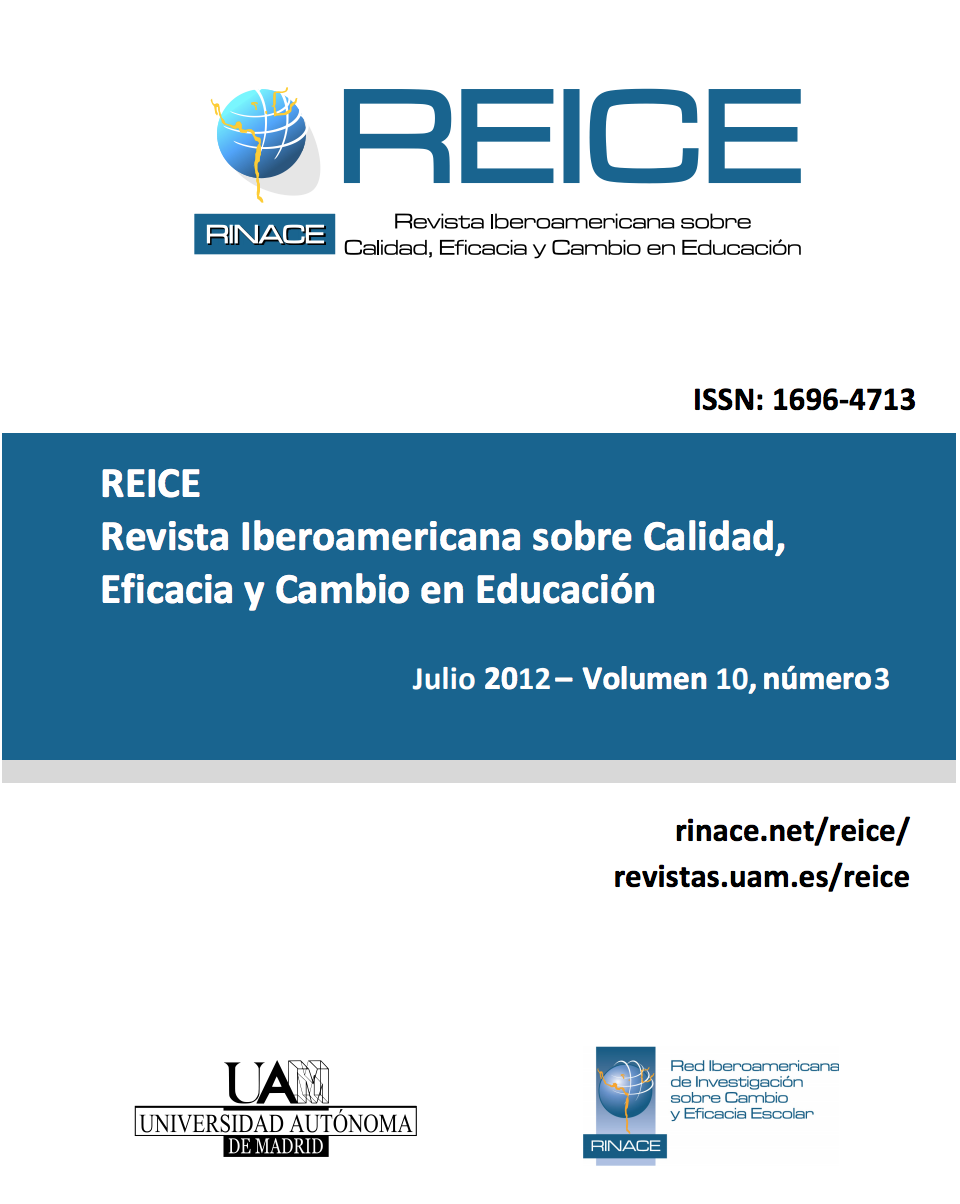The origin of the Processes of School Improvement. A Qualitative Study in Five Chilean Schools
Keywords:
Quality, Effectiveness, Change, Improvement, Equity, InnovationCopyright (c) 2016 REICE. Revista Iberoamericana sobre Calidad, Eficacia y Cambio en Educación

This work is licensed under a Creative Commons Attribution-NonCommercial-NoDerivatives 4.0 International License.
Abstract
This article presents the process and results of an empirical, qualitative research, which seeks to identify and understand the origin and the factors involved in the implementation of school improvement processes. Starting with the proposal on Improving School Effectiveness and the Merton's ideas on ways to adapt to changes. Through an in-depth study of five Chilean schools have initiated change projects with different results, three improved and two remained stalled-, met the elements that characterized those first steps of the project. The results indicate that in centers existed improved internal pressure for change, the role of management leadership, commitment and involvement of teachers, a good working environment and clear support from external agents. While stalled centers were defined by their lack of commitment to the project by the community.
Downloads
References
Bernal, J. (1986). Historia social de la ciencia. La Habana: Ciencias Sociales.
Creemers, B.P.M. y Reezigt, G. J. (2005). Linking school effectiveness and school improvement: The background and outline of the project. School Effectiveness and School Improvement, 16(4), 359–371.
Creemers, B.P.M., Stoll, L. y Reezigt, G. J. (2007). Effective school improvement – ingredients for success: the results of an international comparative study of best practice case studies. En T. Townsend (ed.), International Handbook of School Effectiveness and Improvement.( pp. 825-838). Dordrecht: Springer
Joyce, B. (1991). The doors to school improvement. Educational Leadership, 61(8), 59-62.
Krichesky G.J. y Murillo, F.J. (2011). Las Comunidades Profesionales de Aprendizaje. Una Estrategia de Mejora para una Nueva Concepción de Escuela. REICE. Revista Iberoamericana sobre Calidad, Eficacia y Cambio en Educación, 9 (1), pp. 65-83.
MacBeath, J. (2007). Improving School Effectiveness: Retrospective and Prospective. En T. Townsend (ed.), International Handbook of School Effectiveness and Improvement (pp. 51-74). Dordrecht: Springer.
Merton, R.K. (1970). Teoría y Estructura social. México: Fondo de Cultura Económica.
Muñoz-Repiso, M. y Murillo, F.J. (coords.) (2003). Mejorar los procesos para mejorar los resultados. Bilbao: Mensajero.
Murillo, F.J. (2002). La "Mejora de la Escuela": concepto y caracterización. En F.J. Murillo y M. Muñoz-Repiso (Coords.), La mejora de la escuela: un cambio de mirada. Barcelona: Octaedro.
Murillo, F.J. (2003). El Movimiento teórico-práctico de Mejora de la Escuela. Algunas lecciones aprendidas para transformar los centros docentes. REICE. Revista Iberoamericana sobre Calidad, Eficacia y Cambio en Educación, 1(2).
Murillo, F.J. (2004). Un marco comprensivo de mejora de la eficacia escolar. Revista Mexicana de Investigación Educativa, 21, pp. 319-360.
Murillo, F.J. (2011). Mejora de la Eficacia Escolar en Iberoamérica. Revista Iberoamericana de Educación, 55, pp. 49-83.
Murillo, F.J. y Krichesky, G.J. (2012). El Proceso del Cambio Escolar. Una Guía para Impulsar y Sostener la Mejora de las Escuelas. REICE. Revista Iberoamericana sobre Calidad, Eficacia y Cambio en Educación, 10 (1), 26-43.
Reezigt, G.J. y Creemers, B.P.M. (2005). A comprehensive framework for effective school improvement. School Effectiveness and School Improvement, 16(4), 407–424.
Reynolds, D., Teddlie, C., Hopkins, D. y Stringfield, S. (2000). Linking School effectiveness and School Improvement. En C. Teddlie y D. Reynolds (Eds.), The International handbook of school effectiveness research (pp. 206-231). Londres: Falmer Press.
Scheerens, J. y Demeuse, M. (2005). The theoretical basis of the effective school improvement model (ESI). School Effectiveness and School Improvement, 16(4), 373–385.
Spradley, J. P. (1979). The ethnographic interview. Nueva York: Holt, Rinehart & Winston.
Stoll, L. y Fink, D. (1994). School Effectiveness and School Improvement: Voices from the Field. School Effectiveness and School Improvement, 5(2), 149-177.
Stoll, L. y Fink, D. (1999). Para cambiar nuestras escuelas. Reunir la eficacia y la mejora.Barcelona: Ed. Octaedro.
Valles, M. (2000). Técnicas Cualitativas de Investigación Social: Reflexión Metodológica y práctica profesional. Madrid: Síntesis.
Wetherell, M., Taylor, S. y Yates, S. (2001). Discourse as Data: A guide for analysis. Londres: Sage & The Open University.
Wikeley, F., Stoll, L., Murillo, F. J. y De Jong, R. (2005). Evaluating Effective School Improvement: Case Studies of Programs in Eight European Countries and Their Contribution to the Effective School Improvement Model. School Effectiveness and School Improvement, 16(4), 387-405.
